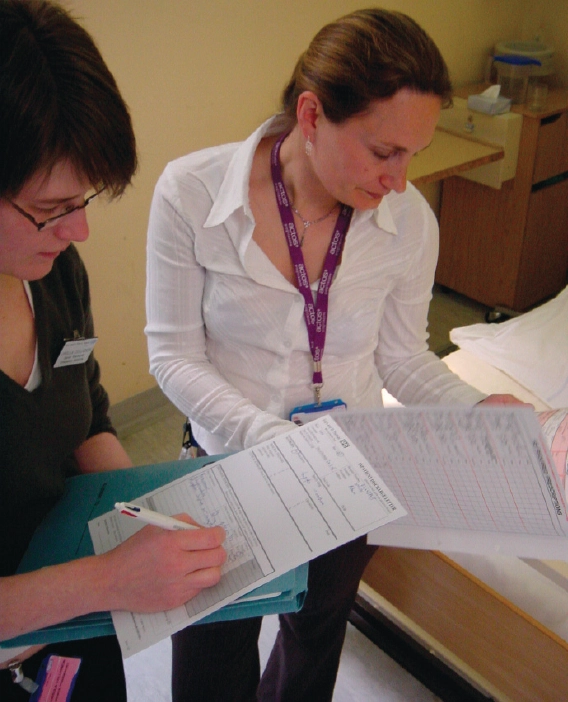
a work-based learning culture
This content was published in 2010. We do not recommend that you take any clinical decisions based on this information without first ensuring you have checked the latest guidance.
Lord Darzi’s “High quality workforce” report1 articulated the need for quality education and training to develop the workforce to meet changing healthcare needs. This may be partly achieved by ensuring the workplace is central to education and training, so providing better integration between education and practice. Such an approach may become increasingly cost-effective in the current economic climate.
In order for this to happen, pharmacy culture needs to change to recognise the workplace as one of the best places to learn. The resulting shift towards work-based learning requires underpinning by a robust educational infrastructure2, which includes the availability of suitably experienced supervisors, facilitators and tutors3,4.
There appears to be little in the literature concerning the ideal skills, attributes and knowledge for a pharmacy tutor. Many pharmacy organisations recognise that the tutoring aspect of educational infrastructure is not always robust, and is often underdeveloped or patchy.
For example, not all preregistration tutors have their tutoring role included in their job descriptions, have undertaken relevant training or have the time allocated to fulfil the role effectively. Tutor roles tend to be subsumed with little succession planning or development of the role. Fewer still are likely to have had their “fitness-to-tutor” capabilities assessed. Moreover, there is little history of accreditation or certification of pharmacy tutors. This situation appears incongruent with the need outlined by Lord Darzi and supports recent exhortation for pharmacy to invest in the education of its practitioners5,6.
The General Pharmaceutical Council will publish education and training standards that lay out requirements for infrastructure and quality assurance (QA) for both undergraduate programmes and preregistration training placements. This should underpin future governance arrangements for training provision up to qualification as a pharmacist. We believe that such governance should be extended and apply to all pre- and post-registration training programmes. At present, career pathways are best developed in pharmacy management or in the area of specialist clinical practice. There is a need to describe a career pathway so that trainers and tutors in pharmacy can also demonstrate that they are competent to undertake their roles and pharmacy departments can plan for future succession effectively. Such a career pathway would provide the opportunity for education supervision to be seen as a point along a continuum of developing expertise rather than a stand-alone activity. This should lead to employers and the GPhC valuing the skills and qualities of tutors in the workplace in the same way as clinical specialists or managers. By way of comparison, tutors in medicine are valued and recognised through the existence of relevant frameworks7 and are designated time and responsibilities through the job-planning process.
Establishment of a working group
In autumn 2009, a working group was established by South East Medicines Management Education and Development, the pharmacy arm of Kent Surrey and Sussex Postgraduate Deanery, with support from the Joint Programmes Board for south-east England and other local stakeholders across the sectors of practice. The group, which became known as “DEPS” (developing educational and practice supervisors in pharmacy), was tasked with producing an accreditation and QA framework for trainers and tutors in a pharmacy context at a local level. A dialogue with the new professional body for pharmacy was initiated as part of the work. The group established terms of reference, a project plan, and a series of eight monthly meetings, with smaller working parties established in between to accelerate larger work streams.
Standardising terminology
The first major work stream was to delineate educational roles and responsibilities in pharmacy, and to standardise the associated terminology. It was agreed that it is imperative that each role is clearly defined and supported by accurately developed competencies and QA mechanisms.
The aim was to rationalise all terms within undergraduate, pre- and post-registration pharmacy education and training, basing them on the umbrella terms established within the medical model of supervision7. After much discussion, we achieved consensus in identifying roles, responsibilities, authority and tasks for pharmacy supervisors across the scope and all sectors of pharmacy practice.
We strongly believed that, by adopting a similar model to medicine, we could strategically align our ideas through the use of language familiar to other professions.
The agreed terms are: practice supervisor (PS), educational supervisor (ES), and educational programme director (EPD). Our use of PS replaces the term “clinical supervisor”, which is sometimes used in medicine, to include the whole scope of practitioners in pharmacy.
Definitions
We propose that practitioners would have the opportunity to progress along the continuum from PS to ES to EPD but that their progress be regulated by both their personal development aspirations and the needs of their organisation. It would also be possible for practitioners to maintain one role while developing the next (eg, an ES for one trainee may also maintain a PS role for all trainees rotating through their clinical area). The roles we list under each term and their functions may not be exhaustive and are open to discussion.
Practice supervisor
Practice supervision in pharmacy relates to day-to-day responsibility for trainees in the workplace. Roles include being available to discuss problems, teaching and facilitation on the job, with developmental conversations and regular feedback. This role includes formal assessment of pieces of work or evidence (eg, competence) during a period of training (often described as a rotation, which may involve end-of-rotation appraisals). PSs will support learners to identify opportunities for learning in the workplace and provide supervision of trainees on a day-to-day basis. They will also identify trainees in difficulty. PSs are involved in and contribute to a work-based learning culture.
PSs may be working in the following roles or equivalents across the sectors of pharmacy practice: national vocational qualification assessor (A1 qualified); NVQ expert witness; undergraduate placement supervisor (unless students undertake a substantive placement and return over time to the same educational supervisor); junior rotational pharmacist rotation lead, ward tutor (otherwise known as “educational facilitators” in the current Joint Programmes Board model); or preregistration trainer, including these roles within mental health trusts and primary care trusts.
Educational supervisor
Educational supervision in pharmacy relates to responsibility for a trainee’s progress during a series of periods of training or an entire programme. ESs are responsible for ensuring that trainees are making the necessary practice-based and educational progress through the use of appraisals and meetings that review periods of training overseen by practice supervisors.
ESs will need all the skills of practice supervision, plus an appreciation of supporting educational theory and standards. The ability to review a trainees’ entire portfolio effectively will also be necessary. This will require a holistic approach rather than assessing single pieces of evidence. They are responsible for trainees’ educational progress programme. This will include formal assessment and sign-off.
ESs should have an understanding of the range of learning, assessment and support opportunities for learning in the workplace, work collaboratively with colleagues to monitor and support a learner’s progression, and foster learner autonomy. They should also be able to identify and support trainees in difficulty, including interfacing with employment performance management procedures.
An ES’s role involves overall supervision and management of a specified trainee’s educational progress during a programme (or series of periods of training), as opposed to a single period of training.
ESs may be working in the following roles or equivalents across sectors of pharmacy practice: site-specific undergraduate placement co-ordinator; preregistration pharmacist tutor, including these roles within mental health trusts and PCTs; diploma practice tutor; NVQ internal verifier; NVQ lead (this person must be V1 or A1 qualified); accredited checking pharmacy technician facilitator; in-process and prechecking accreditation facilitator; or medicines reconciliation accreditation facilitator.
Educational programme director
An EPD oversees one or more entire training programmes locally, regionally, or both, and develops and implements programmes with external bodies and local teams. The EPD ensures that quality criteria are met, including resource, appropriately trained supervisors, possibly selection of candidates, monitoring of progress and equal opportunities. We recommend that consideration be given to an EPD becoming a member of the local senior pharmacy team, where appropriate.
EPDs are likely to be working as specialist practitioners in education, training and development. They may act as the overarching co-ordinator for all programmes within a pharmacy (much like a director of medical education in medicine).
EPDs may be working in the following roles or equivalents across the sectors of pharmacy practice: undergraduate module leader for an experiential learning MPharm module; the preregistration pharmacist training manager; designated pharmacy technician with responsibility for education and training; or diploma lead trust tutor.
“By adopting a similar model to medicine, we could strategically align our ideas through the use of language familiar to other professions”
Other considerations
To establish the roles of PS, ES and EPD in the workplace with sufficient standing, we recommend: a job specification that is agreed by stakeholders; these terms and roles are used when undertaking and documenting reviews against any competency frameworks (eg, a knowledge and skills framework); local training in equality and diversity are accessed; learning opportunities relevant to each defined role are signposted; resources required for work-based learning and assessment are evaluated; and there are defined governance structures to ensure accountability to the correct agencies.
These measures will contribute to a robust educational infrastructure that is essential to support and guide individual learners. Further infrastructure measures will include guidance on time requirements of each role. In comparison with pharmacy, existing clinical and educational supervisor designations in doctors’ job descriptions outline how much time can be spent on assessment, career guidance and helping trainees in difficulty. As such, a “job tariff” concept may be appropriate for pharmacy roles and would be a valuable tool for pharmacy managers planning resources and skill mix for service delivery.
Any changes would need to secure recognition and adoption through all pharmacy organisations, with any resource implications appropriately addressed and expectations or queries managed. We are aware of the need to consider terms such as “accredited” and “credentialed” as national policy develops. In the same way, changes to the pharmacy NVQ will need to be accounted for in this work. The existence of concomitant standards for those who assume these defined roles, for example, relevant national occupational standards, should also be recognised to avoid duplication of skills development.
Conclusion
Our group’s original remit was to develop an accreditation and QA framework for pharmacy tutors. It became clear that this work depends on defining our terminology correctly. Achieving this will provide a foundation to identify the requisite competencies and to demonstrate competence against criteria, as well as a mechanism to map experience to them. Quality education and training implicitly requires accreditation and QA. We would echo these sentiments and strongly believe that this should be a national process that will require rationalisation of terms within work-based pharmacy education in all sectors of practice. As such, we encourage all pharmacy organisations, including the regulator, the professional body and its partners, to consider piloting, wider implementation and eventual ratification of these terms.
Acknowledgements
Other members of the DEPS group who have contributed to this work: Nicola Arnold, Lisa Hemmingfield, Julie Martin, Marc Miell, Helen Middleton, Mike Pettit, Sarah Purdy, Pam Shaw, Lindsey Williamson
References
- Darzi A. A high quality workforce; NHS next stage review. 2008. Available at: www.dh.gov.uk (accessed 16 July 2010).
- Jones S, Safdar A & Jubraj B. Educational Infrastructure: teach a man to fish and you feed him for life. Pharm J 2010;284:45.
- NHS Workforce Review Team. Workforce summary — pharmacy workforce pharmacists and pharmacy technicians. September 2008.
- Department of Health. MEE/MPC 2009. Modernising Pharmacy Careers: Background Note. February 2009.
- Modern regulation requires a greater emphasis on education. Hospital Pharmacist 2008;15:220.
- Pharmacy ignored in global plans. Pharm J 2009;283:264.
- London Deanery Professional Framework for Supervisors. Available at: www.faculty.londondeanery.ac.uk (accessed 16 July 2010).


